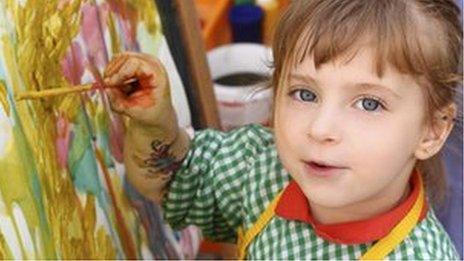Nurseries not preparing children for school - Ofsted
- Published
- comments
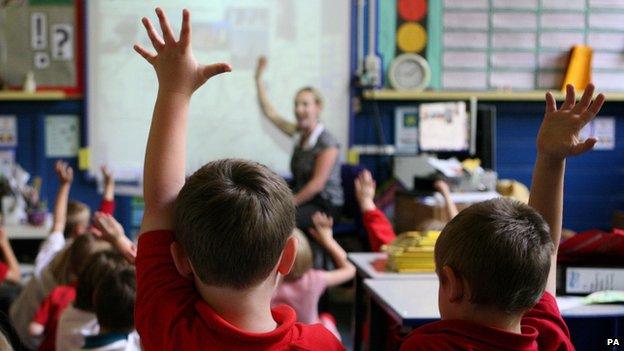
More structured learning led by teachers is the answer, says Ofsted
Too many nurseries are failing to ensure children are ready to learn when they get to primary school, Ofsted's chief inspector says.
Sir Michael Wilshaw says England's poorest children are especially badly served, as only a third reach a good level of development in pre-schools.
A greater emphasis on structured learning within school-based nurseries is the answer, he says.
But child experts say formal learning too early can be counterproductive.
However, Ofsted's findings chime with the government's view of how to improve early-years provision.
Sir Michael Wilshaw: Unprepared children "can't hold a pen, they have poor language and communication skills"
Children's Minister Liz Truss has said repeatedly that she wants to see more teacher-led sessions in the nation's nurseries.
And she has praised nurseries in other European countries, such as France, where children take part in many teacher-led activities.
But the proposals are likely to anger some childcare experts who already argue that early education is damaging children by pushing them too hard at a young age.
'Can't hold a pen'
In a speech launching Ofsted's first stand-alone report on early-years education, Sir Michael highlighted the gap between outcomes for children from disadvantaged backgrounds and youngsters from more affluent homes.
He called for primary school admissions rules to be changed so that greater priority could be given to poorer children - on condition that they had taken up a state-funded nursery place in the school "from the earliest age possible".
Speaking on BBC Radio 4's Today programme, Sir Michael said it was particularly important that nurseries provided good early years education in poorer areas where children tended to be less well prepared for school by their parents.
"More than two-thirds of our poorest children - and in some of our poorest communities that goes up to eight children out of 10 - go to school unprepared," he said.
"That means they can't hold a pen, they have poor language and communication skills, they don't recognise simple numbers, they can't use the toilet independently and so on."
Sir Michael added: "The corollary of not preparing children well for school is that they don't do well in reception and, if they don't do well in reception, they don't get on at key stage one, they find it difficult to read at seven, they fail at the end of primary school and that failure continues into secondary school.
Beatrice Merrick, British Association of Early Childhood Education: ''We must not rush to formal learning too early''
"When we talk about social mobility, rather than focus at the end of school, we should actually worry about what's happening at the very start of a child's life - the rot sets in early."
He said the best provision was in "school-based nurseries and school-led nurseries" because head teachers "can track the progress of children in those school-based nurseries all the way into reception and beyond and make sure they do well".
In his speech later he will say that in some areas of the country, particularly London, "most children do well and the gap between advantaged and disadvantaged is closing".
He will add: "There is nothing inevitable about the link between poverty and failure. Indeed, we have to ask ourselves why, if this is being done well in some places, it isn't being done everywhere else."
'Chronic under-funding'
But National Day Nurseries Association head Purnima Tanuku, also appearing on Today, told Sir Michael he was "missing the most important point here".
"Your own report suggests that more than 80% of private and voluntary day nurseries are actually delivering good or outstanding quality," she added.
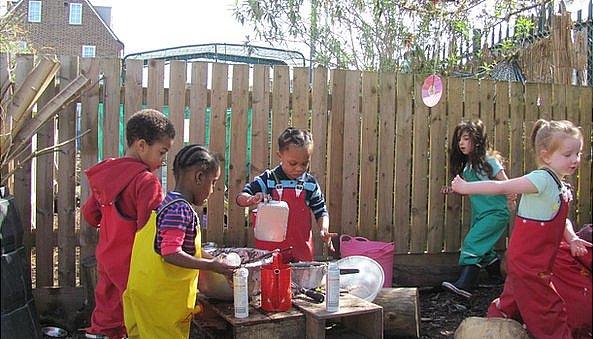
Child-led activities underpin much of what goes on in nurseries
She said Sir Michael was "actually condemning the sector based on a very small minority.
"I'm not sure when the last time Sir Michael set foot into a private or voluntary nursery, as opposed to a nursery school.
"He would see the high quality of play-based learning and a very suitable environment."
And the Pre-School Learning Alliance, which represents 14,000 early-years providers in the private and voluntary sector, said the assertion that school-based nurseries were the best early learning environments for young children was completely misguided.
"We are at a loss to understand why Sir Michael has essentially dismissed the existing huge network of experienced, passionate group settings and childminders who currently provide excellent, and appropriate, care for young children despite chronic under-funding and a never-ending wave of ill-researched, ill-thought-out early-years policies."
Liz Bayram, chief executive of the Professional Association for Childcare and Early Years, said increasing the level of formal education delivered to pre-school children would not help reduce inequality or provide children with a strong foundation for success in the classroom and beyond.
"The evidence shows that high quality childcare delivered through a play-based approach to learning is vital to help children develop the social, emotional and physical skills they need to thrive and is one of the most effective ways to lift children out of disadvantage. A child's confidence, independence and willingness to learn is more important than being able to recognise letters, sit still and focus on a task."
A Department for Education spokesperson said starting to learn from a young age with high-quality teacher-led provision could have a real and lasting impact on children's development and life chances.
'Flexible and affordable'
"High-quality school nurseries will enable children who are behind to catch up with their peers before starting school.
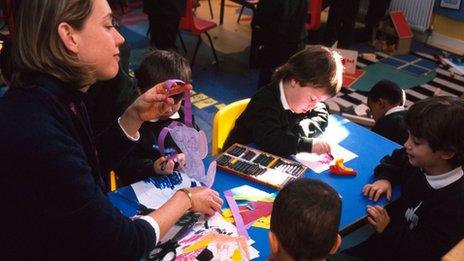
Ofsted inspections have been overhauled to place a renewed focus on basic education for under-fives
"We have been clear that we want to ensure more flexible, affordable and high-quality provision is available for parents - we know many would prefer longer school nursery opening hours, mirroring the working day.
"We have already made great strides in early-years provision with the introduction of the new early-years pupil premium, strengthened early-years qualifications and encouraging schools to open from 8am to 6pm."
- Published27 April 2013
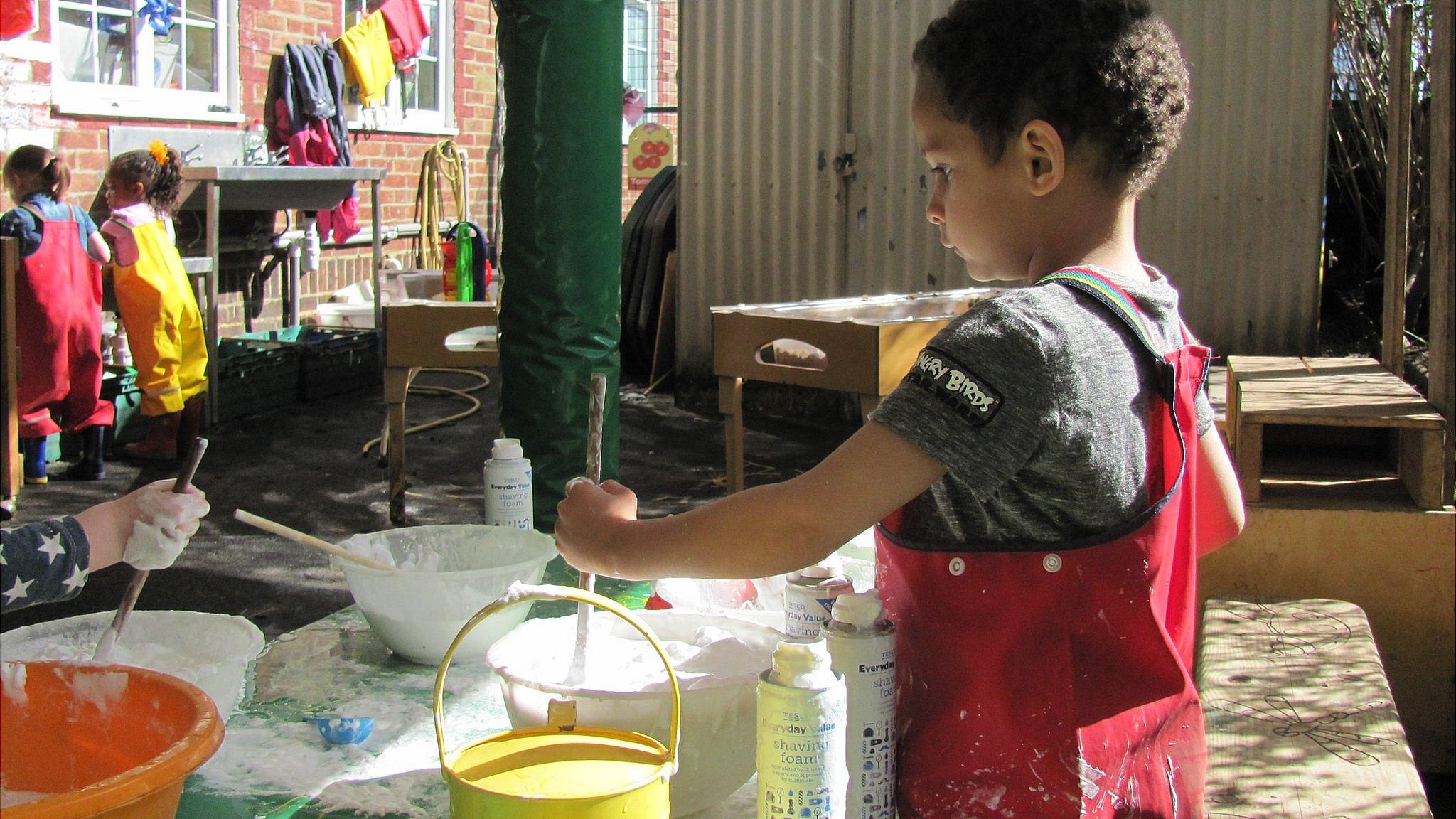
- Published25 June 2013

- Published2 August 2013
